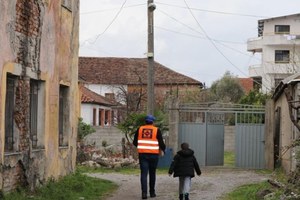The impact of coronavirus in Albania from the 2030 Agenda's perspective
The COVID-19 pandemic hit Albania with the first two confirmed cases on the 8th March 2020. The threat of this new virus was unknown and found the country unprepared. The hospitals were not fully equipped with the needed intubation systems and the capacities of hospitalization were low. How did Albania handle this complex situation and how the SDGs were relevant to face the consequences? In the following article you can find a detailed analysis with a specific focus in the Municipality of Shkodra.
The number of cases in Albania has been growing consistently. The economy was hit by severe restrictions and lockdown measures. There was a list of businesses that could or could not operate during the lockdown. Pharmacies, bakeries and supermarkets were allowed on a limited time during the day from 06 am to 13 pm. The public institutions, schools and universities were instructed to operate online. The State of Natural Disaster came into force from 24.03.2020 till 23.06.2020. While lounge bars, discos and nightclubs remain closed, the Government announced they would reopen the interior of bars, restaurants and swimming pools on 1 October. Several countries, including the UK and Germany, have issued travel warnings on non-essential travel to Albania. The EU borders with Albania remain closed to non-EU residents. Countries such as Germany, Greece and Italy require quarantine and/or negative PCR test results upon entry for residents. On 17 August, the Ministry of Health announced an autumn-winter strategy which includes doubling the testing capacity, hiring and training medical staff and providing free flu vaccines for the groups most in need.
Macroeconomic data: In November 2019, Albania was hit by a high magnitude earthquake, which took a toll on physical infrastructure and economic activity, leaving a burden on the budget prior to COVID-19. According to the Albanian Institute of Statistics, in the second quarter of 2020, GDP in volume terms has decreased by 10.2% compared with the second quarter of 2019. The branch of the economy who contributed the most to this decrease was trade, transport, accommodation and food services by -4.11 ppt. This great impact comes in particular, as tourism accounts for more than 20% of Albania’s GDP, one of the most affected sectors by the pandemic. In July 2020, the number of foreign tourists was found to have decreased by 61.5% compared to last year.
As for the Municipality of Shkodra the measures were the same as the rest of the country. Related to the SDGs, when it comes to SDG 5, which stands for gender equality, there is a two-way analysis. Working-moms were allowed to stay at home as long as schools were closed making them “more favored” from this situation. However, due to economic crisis and worsening conditions on employment, there was a rising trend in the cases of violence. The Municipality of Shkodra set a whole team consisting of psychologists, social workers, economists and lawyers which dealt everyday with the cases in economic and social difficulties.
Related to SDG 10.7, which stands for facilitating orderly, safe, and responsible migration and mobility of people through implementation of planned and well-managed migration policies, it can only be mentioned the obstacles faced from the seasonal workers by the closed borders. Shkodra is very close to Montenegro and due to an overcrowded summer season happening each year across the border, many people worked seasonal jobs there. Consequently, there were rising unemployment indicators in Shkodra.
In terms of SDG 11, luckily (in this situation) Shkodra does not have many lines of public transport as it has been pointed out as one of the most potential place for infections. The local government decided to suspend it. However, the most dangerous transport was the inter-city one, which also was suspended for a period of time.
SDG 13, which stands for climate action, apparently, was the only one to be positively impacted. Less factories working, less traffic (cars and planes) and less tourism meant better air quality and cleaner tourist spots especially in metropols. Although, it was not in the main focus by the central or local government it was a surprising and significant change, which put people into thoughts as how an important issue it is to deal with the climate change challenge.
As SDG 16 deals with peace, justice and strong institutions, the Municipality of Shkodra accepted the challenge and coped well with its own resources and a great network built through the years with CSOs (Civil Society Organizations). On the one hand, around 6000 families were supported with food and hygienic packages. The public institutions, schools, roads and public spaces were disinfected periodically. Elderly people were supported with home services, doing their groceries, buying their medicines or delivering their retirement fund. All were treated as equal and all of the actions above increased the faith in the main institution of the city.
The situation today tells a larger number of infections and deaths, but the hospitals capacities have increased and the economy cannot handle another lockdown. All the business operate from 06 am to 20 pm, and the schools and universities are operating online since the age of infections has decreased to the younger ones. Apparently, we must be used to take care and live with the virus around #inourhands. However, a number of vaccines have arrived and in the following months there is hope for a better situation.

